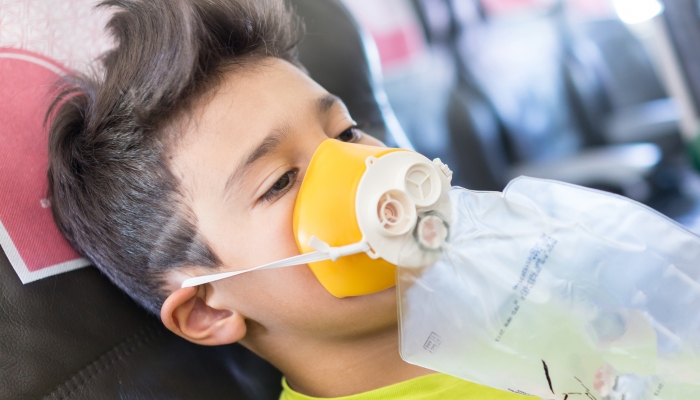7 Tips for Traveling With a Medically Complex Child

- Traveling with a medically complex child requires special considerations.
- Ensure that you have the correct equipment, extra medication, and emergency supplies for your child before you travel.
- Maintain your child’s regular medication and therapy routines as closely as possible while traveling.
- Expect the unexpected and try to be flexible when taking a trip with your child.
Whether for an exciting vacation, a work trip, or a family event, traveling with a child requires a few extra supplies and a lot of extra patience. If you have a medically complex child, this adds another layer of difficulty. Medically complex children may need special accommodations for their medical strollers, equipment, and medications.

Some parents of medically fragile or complex children avoid traveling as much as possible because the challenges seem like too much to overcome. With the right planning, though, traveling with a medically complex child is not only possible but can be an enjoyable experience.
Tip 1: Consult Your Child’s Healthcare Team

Before you head out on a road trip or flight with your medically fragile child, make sure you speak to your healthcare team. You may want to get your child a pre-travel check-up and talk to your child’s medical team about getting extra prescription medication or equipment in case of a medical emergency.
For some conditions, your child’s doctor may recommend that you avoid travel unless it’s for some kind of medical necessity. Some travel plans may need to be adjusted to protect your child’s well-being. In addition, you may need to get a doctor’s note to allow your child to fly with certain medical conditions.
Tip 2: Research Your Destination Thoroughly

Before you travel anywhere, make sure that you research your destination. You will want to know what resources and emergency services are available for you and your medically fragile child. When looking for travel destinations, find information about the following:
- Pharmacies
- Hospitals
- Urgent care centers
When you reach your destination, you may need the help of medical transportation organizations to help you get from place to place. These services11. Transportation to Support Rural Healthcare. Rural Health Information Hub. 2023. https://www.ruralhealthinfo.org/topics/transportation are used for nonemergency transport to and from different types of medical appointments.
If you’re flying, find out as much as you can about the airline you are traveling with. Contact the airline to request special accommodations including early boarding and wheelchair assistance.
You may need extra time getting your child’s medical equipment through the transportation security administration checkpoints and traveling through airports.
Tip 3: Review Insurance and Legal Considerations

Parents of medically complex children are often very familiar with insurance and know what is covered under their plan. However, if you plan to travel internationally, make sure that you call your insurance company ahead of time. Not all plans cover treatment overseas22. Your Health Abroad. U.S. Department of State. 2022. https://travel.state.gov/content/travel/en/international-travel/before-you-go/your-health-abroad.html or evacuation in an emergency.
Some airlines have policies that will refund or allow rebooking for medical emergencies, but make sure you read the fine print of all policies before you count on these, as airlines are not required33. Refunds. U.S. Department of Transportation. 2023. https://www.transportation.gov/individuals/aviation-consumer-protection/refunds to give refunds for illnesses or medical problems. Getting travel insurance is a better guarantee that the cost of your trip will be covered if problems arise.
If you’re flying, make sure you know your rights as a traveler. The Air Carrier Access Act44. Traveling with a Disability. U.S. Department of Transportation. 2023. https://www.transportation.gov/individuals/aviation-consumer-protection/traveling-disability prohibits airlines from discriminating against anyone with a disability during travel and ensures access to accommodations that make travel possible for families with special needs.
Tip 4: Pack Smart – Prepare a Comprehensive Medical Packet and Emergency Kit

Packing for a trip with a medically complex child takes a lot of extra planning and equipment. In the weeks before your planned travel, make a list of medical supplies that you depend on throughout the day.
Having the right adaptive equipment can make or break your family vacation. A durable medical equipment (DME) dealer may be able to help you find equipment that is more portable or easier to transport from place to place.
Tip 5: Maintain Routine and Medication Management

Most children do better with a routine. This is especially true for children with complex medical needs. While air travel and theme park reservations make keeping a consistent routine difficult, your whole family will most likely handle stressful situations better if they have consistent sleeping and eating routines.
Even more important than naps and mealtimes, make sure that your child’s medications are timed correctly while you travel. Many medications like anti-seizure medications and antibiotics are not effective if they are not timed correctly.
Tip 6: Be Prepared for Emergencies

Special needs emergency planning can look a little different than planning for emergencies in children without special needs.
In addition to having a basic first aid kit, think about emergency situations you might encounter and the equipment or medications you might need to manage them. Tracheostomies, seizures, immobility, and feeding tubes are just some of the challenges that parents of medically complex children deal with every day.
Whether you’re flying or driving, ensure you have adequate supplemental oxygen55. Torborg, L.. Mayo Clinic Q and A: Traveling with supplemental oxygen. Mayo Clinic. 2016. https://newsnetwork.mayoclinic.org/discussion/mayo-clinic-q-and-a-traveling-with-supplemental-oxygen, a list of emergency contact numbers, emergency medications, emergency airway devices, and anything you may need for a G-tube or other feeding supplies.
Creating an emergency kit can give you peace of mind while you travel while ensuring the safety of your child.
Tip 7: Embrace Flexibility and Enjoy the Experience

One of the most important things you can do is remain adaptable and enjoy the travel experience. Whether you plan to visit relatives in another city, visit a theme park, or take a tropical vacation, do your best to enjoy the family time together and do not expect everything to go perfectly.
Allow yourself plenty of time to get from place to place, and be willing to change plans as your trip unfolds.

FAQs
What are the key considerations for selecting travel insurance for families with medically complex children?
If you choose to purchase travel insurance, make sure that any emergencies related to your child’s condition will be covered by your plan. Speak to an insurance agent directly rather than doing everything online and ask specific questions about transportation, hospital treatment, and medication coverage.
In addition, find out what costs will be covered if you have to cancel or reschedule your trip. Look for a plan that will cover as many unexpected problems as possible without costing too much up-front.
How can parents negotiate special accommodations for their medically complex child at hotels and resorts?
Many resorts, hotels, and airlines have worked hard to make travel more accessible for medically complex children and their families. Hotel and resort staff should be able to provide helpful tips regarding special accommodations and how to access different resources available to you and your family.
Some hotels or resorts may even have equipment that you can rent such as a medical stroller, supplemental oxygen hoses, wheelchairs, and more.
References
- Transportation to Support Rural Healthcare. Rural Health Information Hub. (2023, December 4). https://www.ruralhealthinfo.org/topics/transportation
- Your Health Abroad. U.S. Department of State. (2022, November 22). https://travel.state.gov/content/travel/en/international-travel/before-you-go/your-health-abroad.html
- Refunds. U.S. Department of Transportation. (2023, May 6). https://www.transportation.gov/individuals/aviation-consumer-protection/refunds
- Traveling with a Disability. U.S. Department of Transportation. (2023, October 5). https://www.transportation.gov/individuals/aviation-consumer-protection/traveling-disability
- Torborg, L. (2016, December 27). Mayo Clinic Q and A: Traveling with supplemental oxygen. Mayo Clinic. https://newsnetwork.mayoclinic.org/discussion/mayo-clinic-q-and-a-traveling-with-supplemental-oxygen

The information WonderBaby provides is not intended to be, and does not constitute, medical or other health advice or diagnosis and should not be used as such. Always consult with a qualified medical professional about your specific circumstances.
Related Posts

Eye Conditions and Syndromes, Visual Impairment
Neuralink Announces Plans to Restore Sight to the Blind with Brain Chip
Elon Musk’s company Neuralink has announced plans to begin human trials of its new “Blindsight” brain chip by the end of 2025.

Special Needs
5 Spring Cleaning Tips for Families of Children with Disabilities
Spring cleaning is an opportunity to create a more accessible, organized, and supportive space for your child with disabilities. Declutter, deep clean, and refresh!

Visual Impairment
The Gift of Understanding: How a Young Child Helps His Blind Father Navigate Life
When a parent is blind, it’s natural for people to wonder how their sighted child will adapt. Will they struggle to understand their parent’s needs? Will they feel burdened by...